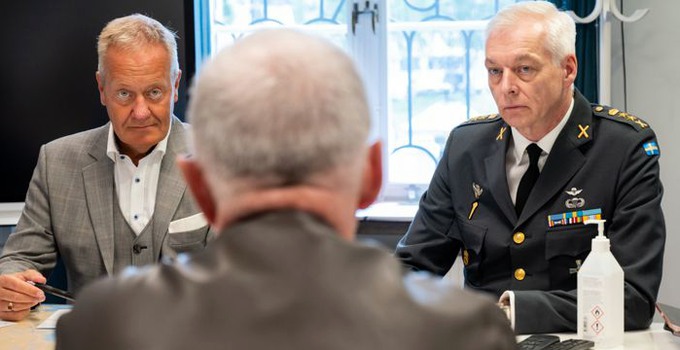
Lt Col Peter Lidén and Lt Col Joakim Paasikivi from Swedish Defence University meet with Ukraine National Defence University Commandant, Col Gen Mykhailo Kovaversity. Photo: Anders G Warne
Ukraine officers share their lessons learned with Swedish colleagues
In the beginning of June, officers from the Swedish Armed Forces got a rare opportunity to meet with Ukrainian officers and academics, here to share what they have learned from the war with Russia. “A unique opportunity to understand our enemy” says Lieutenant Colonel Mattias Söderberg.
Sweden’s officers train for war in line with how Ukraine’s armed forces fight the Russians. However, we need a different mind-set, focusing more on the Swedish Armed Forces core mission and less on peace-time number crunching. We should also be more flexible when procuring military equipment, where tempo triumphs over perfection. These are some of the conclusions from the lessons-learned course at the Swedish Defence University.
On the whole, the Ukrainians’ view of the enemy and the nature of war so far is in many ways reassuring.
“Our doctrines, strategies and tactical regulations are very much in line with our Ukrainian colleagues’ conclusions”, says Lieutenant Colonel Annelie Olausson.
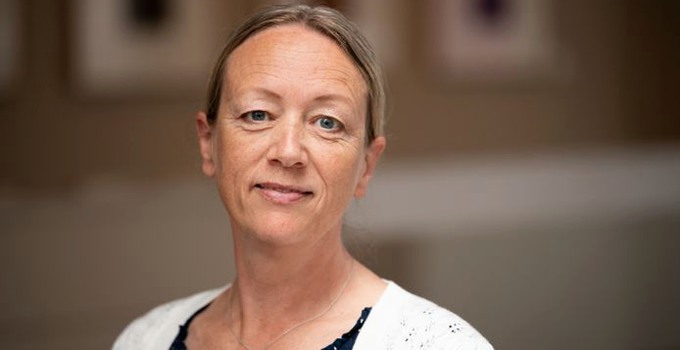
LtCol Annelie Olausson. Photo: Anders G Warne
Among other things, this translates to having small, mobile, and flexible command and control units, mastering joint operations – combining air, naval and army forces and leading through mission command.
“We already think, plan, and train that way at the tactical level. But at the higher command level I’d say we need to re-focus more on what is needed here and now” says Olausson.
She is currently working as head of the Military Strategy Unit and the Department of Operations, Plans and Policy at the Swedish Armed Forces Headquarters. Her colleague Mattias Söderberg is also at the Headquarters, where he is head of a unit working with logistics operations at the Joint Forces Command. They both emphasize that they think our thorough military procurement processes are and will continue to be important, especially for big and complex systems like submarines and fighter jets. But they can also get in the way.
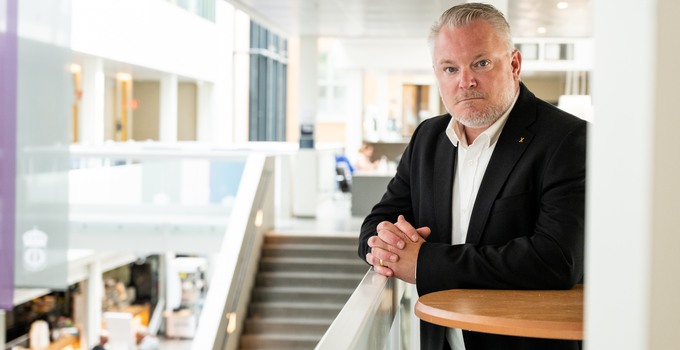
LtCol Mattias Söderberg. Photo: Anders G Warne
Change procurement processes
Both Söderberg and Olausson emphasize that they think our thorough military procurement processes are and will continue to be important, especially for big and complex systems like submarines and fighter jets. But they can also get in the way.
“Look at the Ukrainians having young tech people fast-forward what they need and buying low-cost equipment off the civilian shelves” comments Lieutenant Colonel Mattias Söderberg.
“Meanwhile we risk spending 20 years developing the perfect command and control system. Once it is done it is outdated,” says Olausson.
We meet them both on the last of a three-day lessons-learned course at the Swedish Defence University. It is a warm, beautiful summer day in Stockholm. A week ago, spring semester ended for the university’s civilian students. Today, some 50 Swedish officers are gathered in a lecture room at the Swedish Defence University.
Cyber war and information operations
A team of 12-15 academic officers from Ukraine’s National Defence University in Kiev are here to share what they have learnt from fighting Russia. They cover logistics, Russian information operations (Info Ops), air defence, the use of unmanned vehicles (UAVs), international technical assistance to Ukraine and also how the armed forces work with continuous learning and adapting in the midst of the war. Nothing presented is classified, but to encourage open discussions, only the participants are allowed inside, and no one may quote another.
Education in air-raid shelters
We also get to meet colonel Iryna Izhutova and colonel Yurii Punda from the Ukraine delegation. Izhutova will soon be presenting what they know about Russian information operations. Punda is part of course management and gave the overall introduction on the Russian aggression against Ukraine. While Punda is a line manager in the university administration, Izhutova is a lecturer.
“When the full-scale invasion started 24 February 2022 and the capital was under heavy attack, we had to close down. In the summer education resumed, in a hybrid manner with as many activities as possible on-line and when needed for practical or secrecy reasons on premise. That would often mean in air-raid shelters.” says Izhutova.
The course delegation is headed by their Commandant - colonel general Mykhailo Koval. About half a year ago, he was as deputy commander in Bachmut direction.
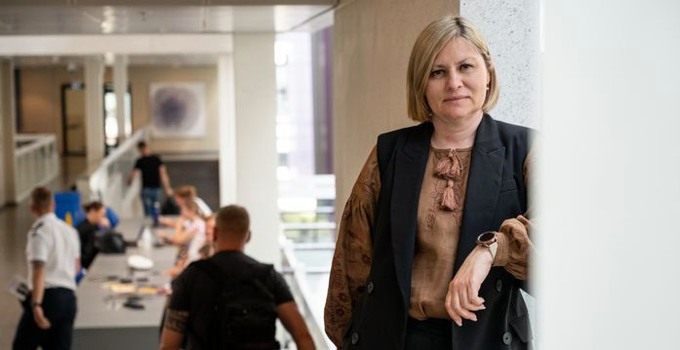
Överste Iryna Izhutova. Foto Anders G Warne
“Practically all staff and students coming in now have combat experience” says Punda.
“And some got sent to the ‘hottest’ places”, says Izhutova.
They do still train officers. Have done so throughout the war. They quickly adapted to the situation. They revised the study programme slightly, made it shorter, more compressed, longer study hours and increased tempo.
“It is impressive how they manage to keep training soldiers and officers to set up new units during war. This is something we can learn from and plan for” says Mattias Söderberg.
They prove training officers in war is perfectly doable. But training for war is something else.
“We are all human beings and sometimes, it’s difficult to be psychologically be prepared for war” says Izhutova.
Drones and new technology
Söderberg and Olausson mention only one hardware area where the Swedish Armed Forces need to step up: new technology such as unmanned vehicles and electronic warfare.
Olausson raises the issue of interoperability and how, in the perfect world, all systems must be fully integrated.
“Ukraine has received weapons and systems from almost all western countries. These systems are not interoperable in themselves, but they manage to set them to good use. Impressive. This shows flexibility and creativity.”
The importance of short-term planning is also emphasized.
“Looking ahead as far as 20 years – has that ever helped us?” says Annelie Olausson referring to the recurrent Long-Term Perspective Study produced by the Swedish Armed Forces. “The world is changing faster than on a ten-, or twenty-year cycle.”
Söderberg nods. Says six-month-cycles seem reasonable given Ukraine’s experience.
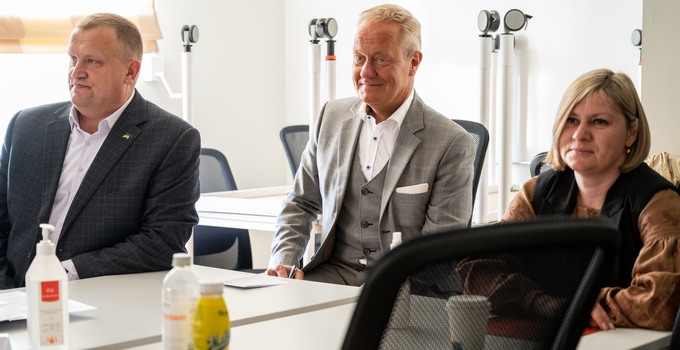
Col Yurii Punda, National Defence University Ukraine, Lt Col Peter Lidén, Swedish Defence University and Col Irynia Izhutova, National Defence University Ukraine participating in the lessons learned course. Both Punda and Izhutova are lecturers during the course and present their insights to their Swedish Colleagues. Photo: Anders G Warne
Always have an eye on the core mission
They both keep coming back to the need for more agile processes, not letting the perfect get in the way of the good enough. They say it boils down to culture and mind-set, to always have an eye on the demands of the core mission.
“One thing that surprised me is how poorly the Russians perform when an operation is drawn-out in time. They seem quite incapable of coordinating their units, even within a single service branch. They seem ill trained and ill prepared for the task.” says Mattias Söderberg.
“That’s why it is so important that we stop thinking of war mission and peace-time production as two separate things. If we get drawn into a conflict either directly or defending an ally in a possible future NATO alliance, we must be able to wage war and continue producing new units to keep fighting for a long time”, says Olausson.
Russian shortcomings and the Ukrainians’ formidable ability to defend their nation are well known and have been reported throughout the war. This course is a chance to learn more, directly from Ukrainian officers, getting in-depth presentations and an opportunity to discuss.
When we ask the Ukrainian guests what has made them so resilient to Russian aggression, they simply say there is no option.
“It is our home we are fighting for.”
Mattias Söderberg reflects upon the differences. Both nations share similar views of the enemy and the war, but the Ukrainians live and fight it.
“For them it is a matter of life and death and the survival of their nation. If you are a soldier in the trenches, you simply do not post photos on social media because you may get your fellow soldier killed. It is an existential war. And then they come to us in Stockholm in beautiful June. The contrast…”
Their Ukrainian colleagues do stress that while war has hit them, it is a fight on behalf of many nations, including Sweden.
“You need to know that your enemy is unpredictable, and war is only a couple of hours away”, says Izhutova.
Their advice for Sweden?
“You need to have a joint Swedish idea that all of society adheres to and want to fight for” says Yurii Punda.
Both he and Izhutova express that meeting with the Swedish officers is rewarding also for them.
“The questions from our Swedish colleagues makes us learn new things as well”, says Punda.
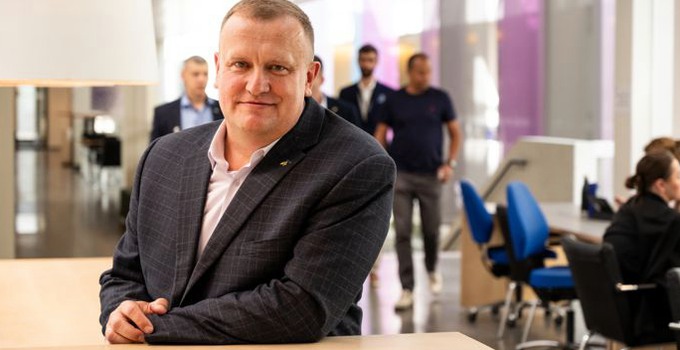
Överste Yurii Punda. Foto Anders G Warne
A more trusting culture
Mission command and a “culture of responsibility” are important features of the Swedish Armed Forces. But does that translate to a trusting culture where military leaders are encouraged to think outside the box, question old assumptions and act rather than not?
Söderberg and Olausson think that the organisation’s logic is not to make mistakes according to protocols, methods, and regulations. They believe it is befitting that the course takes place at the Swedish Defence University, where future military leaders are educated and trained to think critically, being flexible and creative.
”Having met the Ukrainians, what we know becomes more obvious and urgent. In the end it is all about saving lives on the battlefield. It is not adhering to a specific protocol or process”, says Mattias Söderberg.
“We need to always think: how will we do this when we are doing our core mission, when our nation or our allies future is at stake?” says Annelie Olausson.
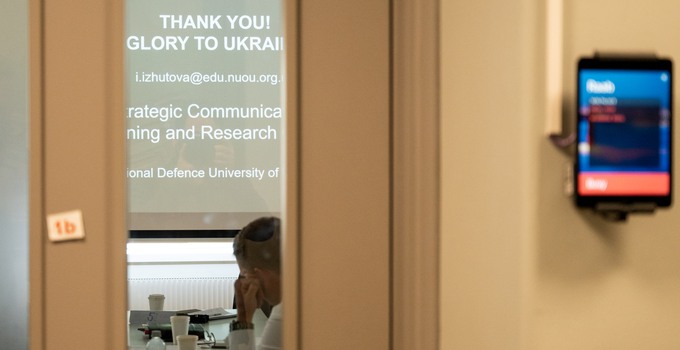
Photo: Anders G Warne
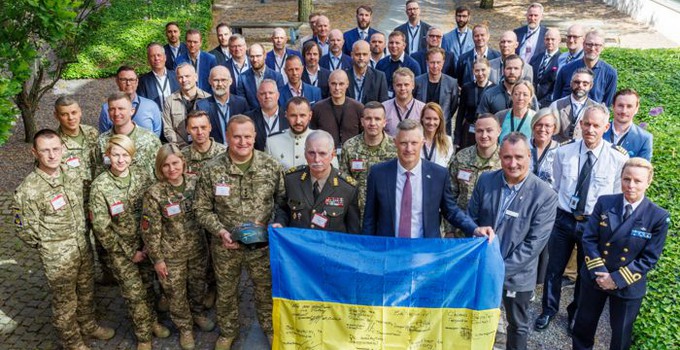
Ukrainian delegation and the course participants. Col Gen Mykhailo Koval, head of National Defence University Ukraine and Swedish Defence University Vice-Chancellor Robert Egnell. Photo: Björn Dalin
Page information
- Published:
- 2023-07-25
- Last updated:
- 2023-08-21
